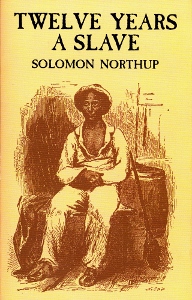Freedom Denied…
Author: Solomon Northup
 Great American heroes like Harriet Tubman and Frederick Douglass are known to anyone who was paying attention in American history class, but until recently I’d never heard of Solomon Northup, another former slave who was one of their contemporaries. While his routes to slavery and subsequent freedom were markedly different, his life story is equally compelling and heroic. He tells it himself in Twelve Years a Slave.
Great American heroes like Harriet Tubman and Frederick Douglass are known to anyone who was paying attention in American history class, but until recently I’d never heard of Solomon Northup, another former slave who was one of their contemporaries. While his routes to slavery and subsequent freedom were markedly different, his life story is equally compelling and heroic. He tells it himself in Twelve Years a Slave.
Born in 1808 to a free black father in Minerva, New York, Solomon received a solid education, learned to play the violin, married, raised three children and worked various jobs in rural New York, establishing himself as a citizen of honorable stature. However, his unremarkable life was changed forever in 1841 when he was drugged and kidnapped from his hometown by two visiting businessmen. In chains and stripped of any identifying documents he was transported south to Virginia where his protestations of freedom were met with violent whippings. Beaten into submission and shipped onward by sea, he was eventually sold to a plantation owner in the bayou country of northern Louisiana where he would spend the next twelve years in the darkest servitude.
Uprooted from anything he had ever known, Northup tells his story with an astonishing balance of sorrow and objectivity. Despite his violent hatred of the institution of slavery, the regular beatings he receives and his daily yearning for an opportunity to escape, he never hesitates to point out the frequent acts of kindness that he encounters during his time as a slave. While witness to some of the most cruel and vile acts imaginable, he somehow manages to hold onto his humanity. As the title alludes, a fortuitous combination of events leads to his freedom in 1853 and reunification with his family.
Shortly upon his return to New York, Northup was motivated to write his story due to the widespread belief, even in the North, that slavery really wasn’t so wicked, that maybe it was “good for the Negro” to have such a rigorously structured system for their “employment”. Just one year earlier, Uncle Tom’s Cabin had been published and had met with strong criticism from slave holding states, protesting that the mistreatment of slaves had been flagrantly exaggerated, so much so that Harriet Beecher Stowe felt the need to publish a second book presenting the source material for her original novel. Northup wanted to fully document that, at least in Louisiana, the reality of slavery was as horrific as the most zealous abolitionists claimed. Throughout the book he includes the details of his widespread contacts throughout the Red River Valley in order to buttress the veracity of his claims.
While the modern reader may find Northup’s early 19th century writing style a bit of a challenge, I actually grew used to the formal prose rather quickly. The author frequently shows great restraint in the descriptions of the horrors he witnesses, lest he be accused of hyperbole or embellishment. His matter-of-fact delivery – as if he were testifying in court – stands in such stark contrast to the daily terrors he describes that it makes the story that much more moving and gut-wrenching.
In the end, Twelve Years a Slave is both a profound memoir and a well written, passionate abolitionist document from an involuntary inside informant. Strongly recommended for anyone interested in American history or who has never heard of Solomon Northup.
— D. Driftless
- Best Non-Fiction of 2016 - February 1, 2017
- Little Free Library Series — Savannah - May 22, 2015
- Little Free Library Series — Wyoming - November 30, 2014


Leave A Comment